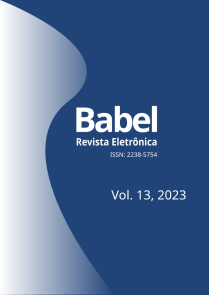Which language and why?: the right and the reasons for choosing a foreign language in High School at Colégio de Aplicação of UFS
DOI:
https://doi.org/10.69969/revistababel.v13i.18090Keywords:
High School, Foreign languages, Right and reasons for choiceAbstract
This article aims at analyzing what high school students at Colégio de Aplicação (Laboratory School) of the Federal University of Sergipe (CODAP/UFS) think about the law and the reasons for choosing a foreign language at this stage. The research was developed in the context of an undergraduate research project in high school at CODAP/UFS with the application of a questionnaire. The research project followed a theoretical-methodological framework that dialogues with the agenda of contemporary Applied Linguistics with regard to studies on education, interculturality and language policies. The research project was qualitative and interpretive in nature. The results showed the appreciation of plural linguistic contact at CODAP/UFS and the recognition of the respondents, i. e. the high school students, on the importance of being able to choose a foreign language in High School. Among the reasons mentioned are personal interest, the influence of the media or family and the relationship with the professional future or with university admission exams such as ENEM. In addition, the heterogeneity of the group and their responses confirmed that it is not fair to generalize the conclusions and that it is necessary to respect the subjectivities regarding the choice of a language and broaden the perspectives on education in foreign languages in public schools.
Downloads
References
BRASIL. Base Nacional Comum Curricular. Brasília: MEC, 2018. Disponível em: < http://basenacionalcomum.mec.gov.br/images/historico/BNCC_EnsinoMedio_emb aixa_site_110518.pdf>. Acesso em: 08 jun. 2023.
BRASIL. Lei nº 13.415, de 16 de fevereiro de 2017. Altera as Leis n º 9.394, de 20 de dezembro de 1996, que estabelece as diretrizes e bases da educação nacional, e 11.494, de 20 de junho 2007, que regulamenta o Fundo de Manutenção e Desenvolvimento da Educação Básica e de Valorização dos Profissionais da Educação, a Consolidação das Leis do Trabalho - CLT, aprovada pelo Decreto-Lei nº 5.452, de 1º de maio de 1943, e o Decreto-Lei nº 236, de 28 de fevereiro de 1967; revoga a Lei nº 11.161, de 5 de agosto de 2005; e institui a Política de Fomento à Implementação de Escolas de Ensino Médio em Tempo Integral. Disponível: <http://www.planalto.gov.br/ccivil_03/_ato2015-2018/2017/lei/l13415.htm>. Acesso em: 08 jun. 2023.
BRASIL. Orientações Curriculares para o Ensino Médio. Linguagens, Códigos e suas Tecnologias. Secretaria de Educação Básica. Brasília: Ministério de Educação, 2006. Disponível em: < http://portal.mec.gov.br/seb/arquivos/pdf/book_volume_01_internet.pdf>. Acesso em: 08 jun. 2023.
BRASIL. Lei nº 11.161, de 5 de agosto de 2005. Disponível em: <http://www.planalto.gov.br/ccivil_03/_ato2004-2006/2005/lei/l11161.htm>. Acesso em: 05 jun. 2023.
BRASIL. Parâmetros curriculares nacionais (Ensino Médio) – Linguagens, Códigos e suas Tecnologias. Brasília, 2000. Disponível em: <http://portal.mec.gov.br/seb/arquivos/pdf/14_24.pdf>. Acesso em: 04 jun. 2023.
LAGARES, Xoán Carlos. Qual política linguística?: desafios glotopolíticos contemporâneos. Parábola Editorial, 2018.
PARAQUETT, Marcia. As dimensões políticas sobre o ensino da língua espanhola no Brasil: tradições e inovações. In: MOTA, Kátia e SCHEYERL, Denise (Org.). Espaços Linguísticos. Resistências e expansões. Salvador, UFBA, 2006, p. 115-146.
RAJAGOPALAN, Kanavillil. Política de ensino de línguas no Brasil: história e reflexões prospectivas. In: MOITA LOPES, L. P. Linguística Aplicada na modernidade recente: festschrift para Antonieta Celani. São Paulo: Parábola, 2013, p. 143-161.
UFS. Conselho do Ensino, da Pesquisa e da Extensão. Resolução nº 42, de 10 de dezembro de 2021. Altera a Matriz Curricular do Ensino Fundamental e do Ensino Médio do Colégio de Aplicação da Universidade Federal de Sergipe. São Cristóvão, Sergipe: dez. 2021.
Published
How to Cite
Issue
Section
License
Copyright (c) 2023 Babel: Revista Eletrônica de Línguas e Literaturas Estrangeiras

This work is licensed under a Creative Commons Attribution-ShareAlike 4.0 International License.
Os autores detém os direitos autorais sem restrições, porém ao submeter os originais, concordam em transferir a este periódico os direitos da primeira publicação. Isto deve ser informado em caso de nova edição do texto. As produções que derivarem deste material, devem obrigatoriamente citar a fonte. Os textos publicados nesta revista, salvo indicações contrárias, encontram-se sob uma licença Creative Commons Atribuição 4.0 Internacional.

